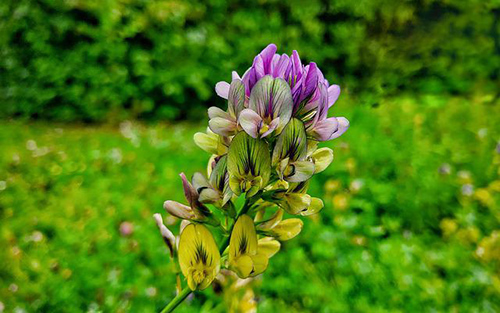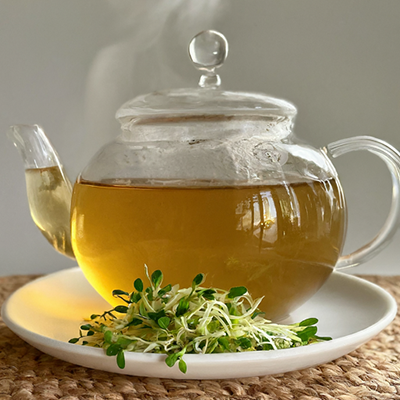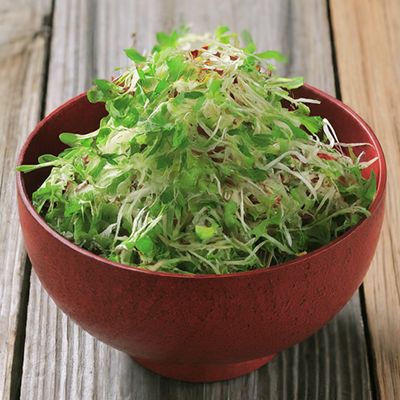Contents
Horses are incredibly fortunate whenever they get to eat alfalfa. From ancient times, domestic animals have enjoyed the advantages of this nutritious plant. At the same time, their rational owners dismissed it as they regarded it as an inelegant food to put on their tables.
Thanks to modern analytical chemistry, today, we know the excellent properties of this humble plant, and fortunately, more and more people are taking advantage of it.

Healing Properties
The YOUNG BUD SEEDS (germs) of alfalfa are rich in calcium (525 mg per 100 grams, three times that of milk), phosphorus, provitamin A as beta-carotene, vitamins C, B, and K, enzymes, essential trace elements, and other nutrients, besides vegetal bran.
Therefore, the ALFALFA has remineralizing, invigorating, hemostatic, and infection-protective properties. It is especially recommended for:
- Anemia is due to a lack of vitamins or minerals.
- Malnutrition and rickets.
- Gastro-duodenal ulcers.
- Dyspepsia and intestinal fermentation due to its enzyme content.
- Constipation is caused by its vegetal bran content.
- We are aware of nose, gastric, and uterine bleeding. We remind you that a physician must check for any abnormal bleeding.

Alfalfa is a herb that is used internally. It must be used in fresh raw form to provide essential nutrients—which it is loaded with. Every vitamin and primary mineral is in alfalfa, except vitamin D. The plant aids in assimilating carbohydrates, proteins, and fats and is an excellent blood purifier. It can be included in soups and salads. 8 alfalfa tablets, taken at mealtime (if possible, chew before swallowing), offer a fiber bulk that substantially helps sustain bowel regularity.
Alfalfa sprouts are a great favorite with many people but rinse them thoroughly before serving them to remove bacteria and mold. Because it has comparable properties, alfalfa has been substituted for red clover blossoms. It is suitable for lowering fevers. Alfalfa detoxifies and alkalinizes the body, reduces cholesterol, stabilizes blood sugar and hormones, and stimulates pituitary function. It reduces inflammation, attacks fungi, acts as a diuretic, and helps reduce various types of bleeding.
Alfalfa is also effective against ulcers, digestive issues, bones, joints, and skin disorders. It can balance hormones and blood sugar and reduce cholesterol, which can be beneficial for arthritis and other various bone and joint conditions. Consuming daily can help cure peptic ulcers, eliminate retained water, relieve bowel and urinary problems, and improve appetite.
The name al-falfa comes from “father of plants,” given by the Arabs. They were among the first to realize the plant’s exceptional healing properties.
Alfalfa Scientific Facts
- Scientific Name—Medicago sativa L.
- Other Names—Lucern, luceme.
- French—Luzerne.
- Spanish—Alfalfa.
- Environment—Native to the Middle East, it is farmed in warm regions worldwide.
- Description—Fodder plant of the Leguminosae family, growing from 30 to 80 cm high, with bluish flowers. Its fruit is a small legume, spiral-shaped like a snail.
- Parts of the plant used medicinally—The whole plant.

The Germs
Alfalfa seeds can be grown at home and consumed by the young stems (germs). These germs are especially rich in vitamins and minerals.
How to use Alfalfa
- Food. Like many other vegetables, alfalfa can be consumed raw or cooked in a salad (germs). Its vitamin C content withstands cooking very well.
- Fresh juice. A glass in the morning is an excellent refreshing drink.
- Infusion, with 30 grams per liter of water. Drink from three to five cups a day.
- Dry extract. Half to one gram a day.
Infusion: Steep for five to fifteen minutes. Tincture: Take five to fifteen drops three times daily. Fluid extract: Take ½ to one teaspoon three times daily. Powder: Take five to ten #0 capsules (thirty to sixty grams) thrice daily.
DISCLAIMER: All content on this website is presented solely for educational and informational objectives. Do not rely on the information provided as a replacement for advice, diagnosis, or treatment from a qualified medical expert. If you are pregnant, nursing, or have any preexisting medical concerns, talk to your doctor before using any herbal or natural medicines.
REFERENCES
- George D. Pamplona-Roger, M.D. “Encyclopedia of Medicinal Plants.” George D. Pamplona-Roger, M.D. Encyclopedia of Medicinal Plants. Ed. Francesc X. Gelabert. Vols. 1 San Fernando de Henares: Editorial Safeliz, 2000. 269. Print.
- Vance Ferrell Harold M. Cherne, M.D. The Natural Remedies Encyclopedia [Book]. – Altamont, TN : Harvestime Books, 2010. – Vol. Seventh Edition : 7 : pp. 142.
- WebMD: https://www.webmd.com/diet/health-benefits-alfalfa
- RxList: https://www.rxlist.com/supplements/alfalfa.htm
